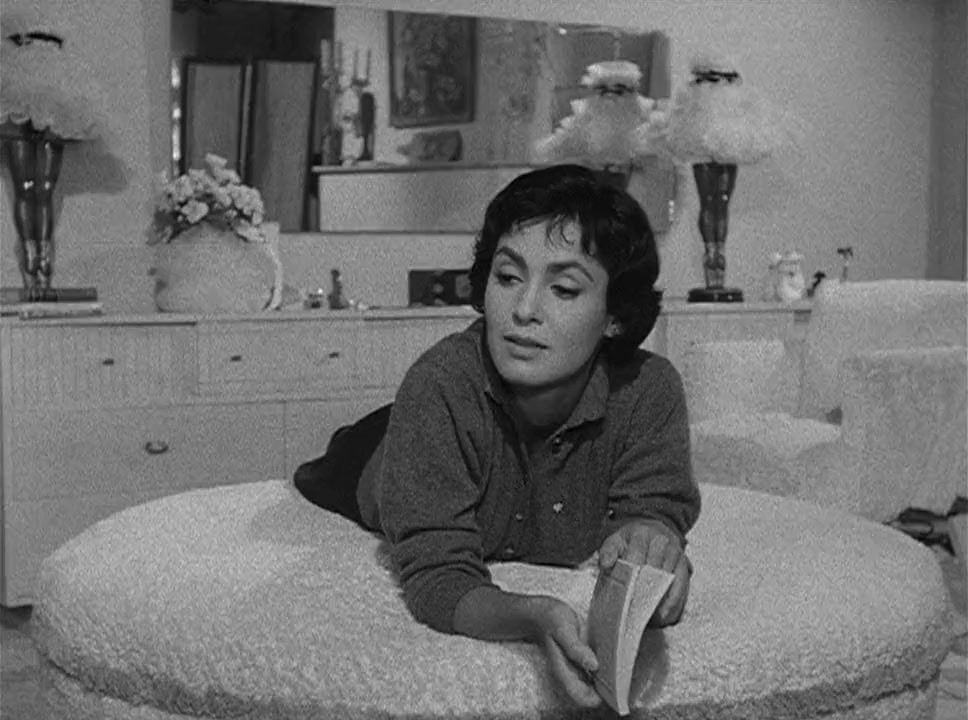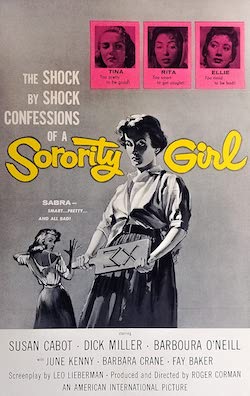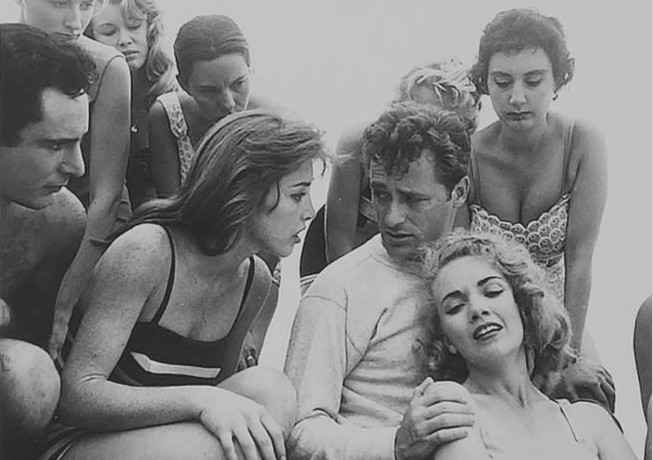
Sorority Girl (USA, 1957) 61 min B&W DIR-PROD: Roger Corman. SCR: Ed Waters. STY: Leo Lieberman. MUSIC: Ron Stein. DOP: Monroe P. Askins. CAST: Susan Cabot, Dick Miller, Barboura Morris, June Kenney, Barbara Cowan, Fay Baker, Beach Dickerson. (American International Pictures)

Sorority Girl opens with weird Munch-like paintings during the credits, all nightmarish grey swirls featuring a solitary female being persecuted by forces all around her. If Freudians had skipped the art house and went to the drive-in that week instead, they would have have been rewarded with this title sequence alone. Even more, this is a surprisingly complex study of human behaviour, neither as lurid nor as exploitative as the title implies.
While this is a solidly acted and written melodrama, it mostly suffers for an obviously rushed production schedule. This movie cries out for some in-your-face close-ups, but instead these long master shots reminiscent of Carl Dreyer, replace a lot of opportunity to make a frenetically paced little mood piece. But for all that, Sorority Girl is nonetheless a compelling experience.
Susan Cabot is best remembered today for her silly role in The Wasp Woman, but her role as Sabra shows her ease in playing such a complex character- nurturing one moment, demonic the next. This movie also features a strong supporting role for Barboura Morris (as Rita), a wide-eyed long-legged natural beauty who I think was a true untapped talent, whose career dried up much too soon (and her untimely death at age 43 prevented her from being rediscovered). Her roles mostly required being second banana to Susan Cabot, but with her quietly mysterious presence and subtle delivery, she stole every scene she shared with the leading lady.
Sabra has to make some money because her estranged mother has cut off her allowance. (Of course, blowing 85 dollars on a skirt wasn’t the brightest financial decision, either). Thus, she concocts a blackmail scheme by coaxing Tina (June Kenney), a pregnant waitress, to bilk some money from her boss Mort (Dick Miller!) by threatening to tell everyone that he is the father of her child if he doesn’t pay. Sabra even sneaks a peak in Rita’s diary, and threatens to tell everyone, right in the middle of her student presidential campaign, that her father is an ex-con.
Sabra’s mother (Fay Baker) is an omnipresent figure, even if she only appears in two scenes. While at first the frivolous Sabra is spoiled and undisciplined, her mother’s seemingly cruel act of cutting off her allowance is actually a form of much-needed discipline. Interestingly, Sabra acts like a cruel mother figure to the plump Ellie (Barbara Cowan), ordering her to do exercises, and then spanking her with a paddle when she is lazy.

All of this culminates on the beach, when Dick Miller comes to save the day. Yet perhaps Rita says it best: “You’re not human- you’re something the sea cast up.” Still, this is hardly a “bad girl” melodrama. In this complex study one is forced to examine these relationships more fully. Is Sabra’s behaviour due to her segregation from the other girls? Are they equally culpable for her devious acts? The film ends on this uncertain note.
While not particularly well made, Sorority Girl is a well-acted quickie with a more profound narrative than one would expect to find in a “troubled teen” picture of this era. This was another of Roger Corman’s 1950s quickies that only briefly appeared on VHS, and sorely needs a DVD release. (As of this writing however, it can be viewed for free on Shout Factory TV or on Tubi.)
Originally published in The Roger Corman Scrapbook, 2006.
